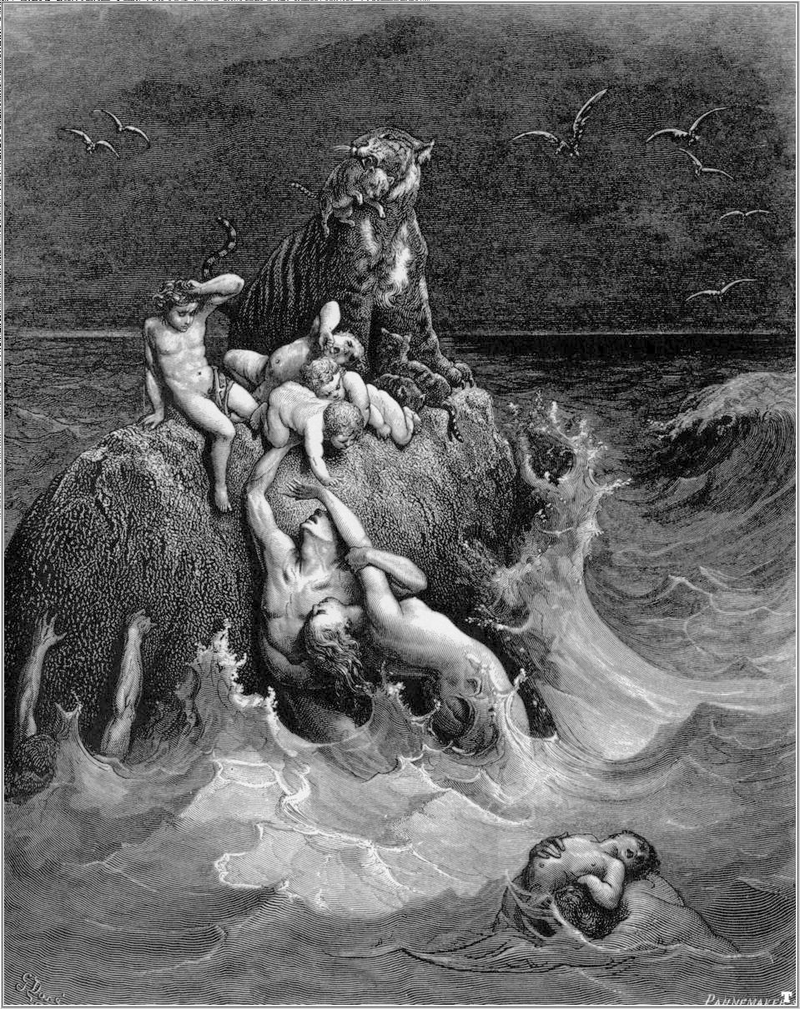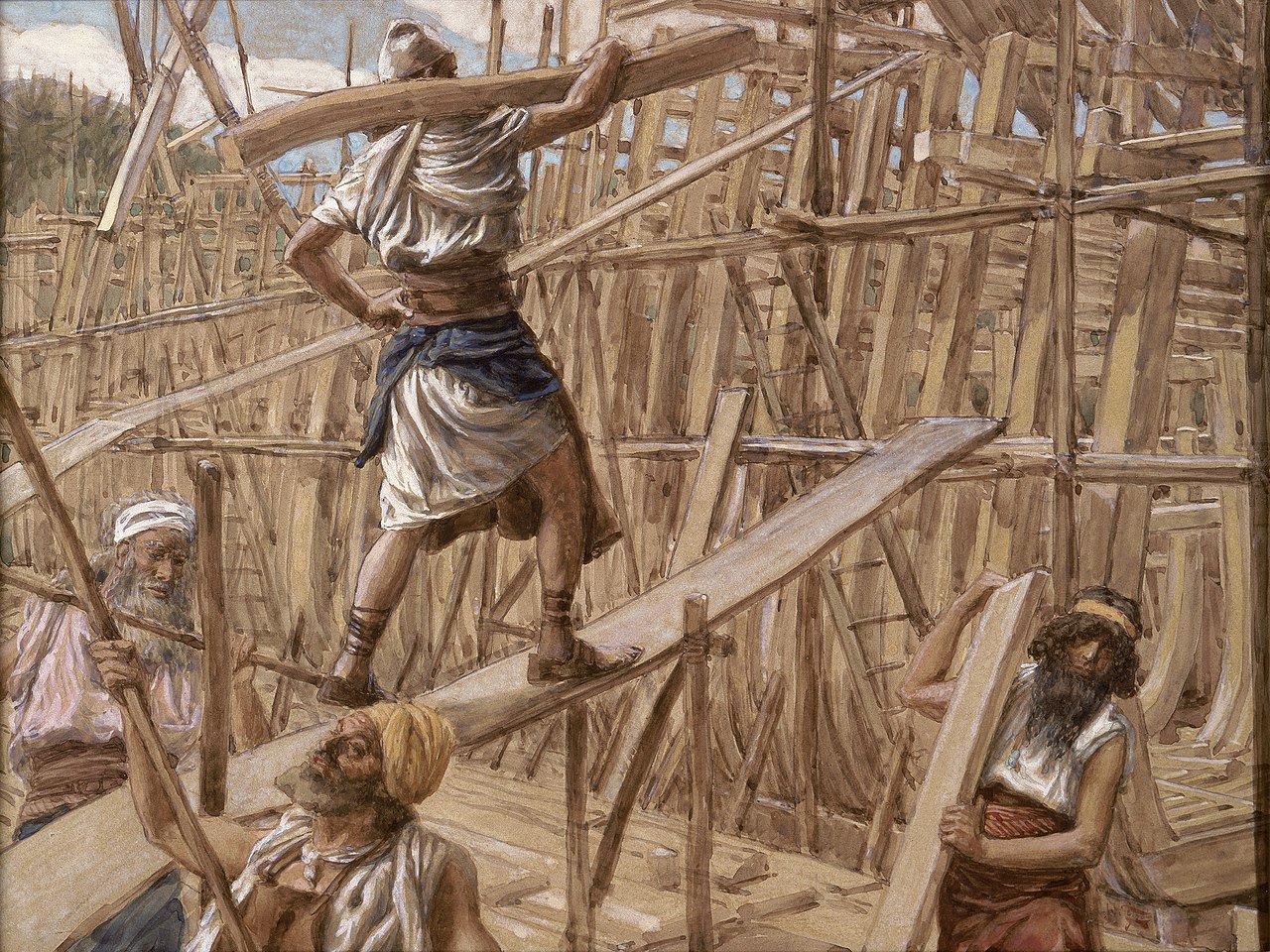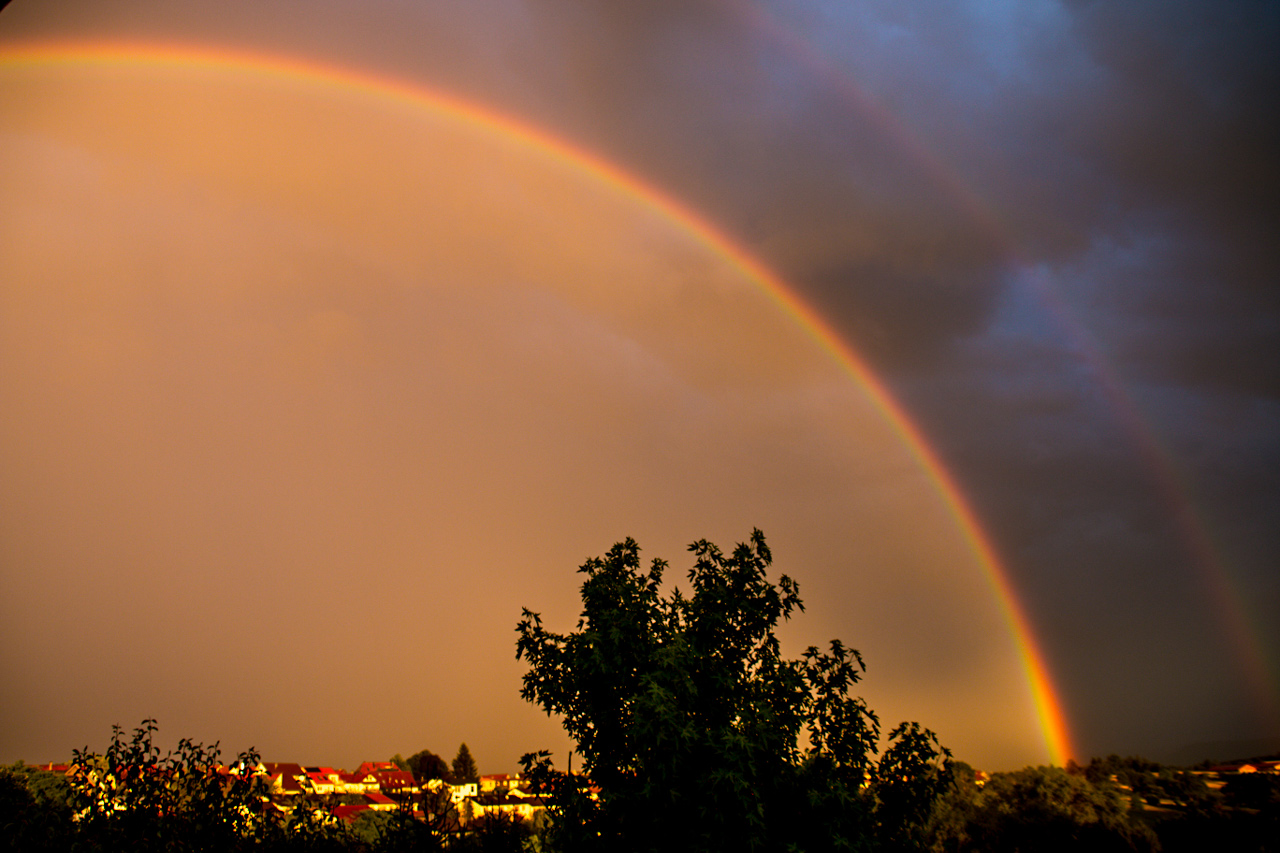| Years until the Flood | Event | Bible Reference |
| 120 | Countdown to the Flood begins | Genesis 6:3 |
| 100 | Noah has Japheth, the first of his sons, when he was 500 years old. | Genesis 5:32; Genesis 10:21 |
| 98 | Noah has Shem who was 100 two years after the Flood. | Genesis 11:10 |
| ? Perhaps 95 or 96 the same time between Japheth and Shem. | Ham was the youngest one born to Noah and was aboard the Ark, so he was born prior to the Flood. | Genesis 9:24; Genesis 7:13 |
| ? Perhaps 20–40 years for all of the sons to be raised and find a wife | Each son was old enough to be married before construction on the Ark begins. | Genesis 6:18 |
| ~ 55–75 years (estimate) | Noah was told to build the Ark, for he, his wife, his sons, and his sons’ wives would be aboard the Ark. | Genesis 6:18 |
| Ark Completed | ||
| ? | Gather food and put it aboard the Ark. | Genesis 6:21 |
| 7 days | Loading the Ark. | Genesis 7:1–4 |
| 0 | Noah was 600 when the floodwaters came on the earth. | Genesis 7:6 |
| Source: answersingenesis.org | ||
The Flood (-2348 to -2348)
BackThe Flood
The Flood is described in the narratives of various ancient cultures as a God-sent flood catastrophe that aimed to destroy all mankind and land animals.
Few, especially God-fearing individuals, survived the catastrophe. The reasons for the Flood, the narratives usually mention the wrath of God or the gods over the transgressions of mankind. The most famous reports have been written in:
- Sumerian from King Ziusudra of the city of Šuruppak in the Atraḫasis epic.
- Babylonian via Utnapishtim in the Gilgamesh epic and in the Atraḫasis epic.
- Greek about Deucalion and his wife Pyrrha and
- about Noah and his family in the 1st Book of Moses of the Bible.
At Timeline-Of-Humanity we follow the biblical narrative, which according to the Old Testament and its biblical chronology had taken place in the year -2348 BC.
Countdown to the Flood begins (-2468)
The timeline of the Flood (-2348)
According to the Old Testament, Noah was warned by God of a Flood and ordered to build a large box-shaped ship to save himself, his family and the land animals. The Flood lasted one calendar year and 10 days. Even the mountain tops were covered with water (Gen 7:10-24 EU and Gen 8:1-14). The flood is described in several phases:
- In Noah's 600th year, the flood began on the 17th day of the second month.
- 40 days the flood lasted on earth. After a total of 150 days of swelling, the waters subsided.
- On the 17th day of the seventh month, the ark was stranded in the mountain Ararat.
- On the 1st day of the tenth month, the first mountain peaks became visible.
- On the 11th day of the eleventh month, Noah opened the window and let a raven fly: It flew out and in until the water on the earth dried up.
- In Noah's 601st year, the water had dried up on the 1st day of the first month.
- Noah left the ark on the 27th day of the second month.
Changes before and after the Flood (-2467)
One possible difference in the world before the Flood was the water above the earth. During the second day of creation, the Bible says, God separated the water above the earth from the water below the earth.
According to Genesis, 1:6-8, "And God commanded, "Let a vault be formed in the waters to separate the waters!" So it happened: He made a vault and separated with it the water above from the water that covered the earth. The vault he called "heaven."
This could be interpreted as a water steam sky (baldachin) enveloping the earth and creating a greenhouse effect. This would lead to the fact that on the whole world a moderate temperature prevailed. This could explain the rich vegetation and the long life of the inhabitants.
Rain clouds
Others believe the firmament was made up of rain clouds and refer to Psalm 148:4-6: "Praise him, you heavens of heavens, and your waters above the heavens. Let them praise the name of the Lord, for he has commanded it and they were created. He has also established them from everlasting to everlasting; he has made decrees that will not pass away."
No rain?
The Bible may teach that there was no rain at all before the Flood:
Before any plant of the field was on the earth, and before any herb had grown in the field. For the Lord God had not caused it to rain upon the earth ... but a mist went up from the earth, and watered the whole face of the ground. (Genesis 2:5,6).
However, it is not clear here if after the Fall the climatic conditions were still the same. Likewise, it is not clear if there were seasons at all until the time of the Flood or if the climate was much more balanced globally. A hint that the seasons adjusted after the flood is the following hint:
As long as the earth endures, sowing and reaping, cold and heat, winter and summer, day and night shall not cease. (Genesis 8:22)
Longevity
Before the Flood, people lived much longer according to the Old Testament. It was only a few generations until the flood and although sin entered the universe, degeneration was not yet so advanced and made the long life possible.
Embedded Videos
Noah's Flood and Catastrophic Plate Tectonics (from Pangea to Today)
Noah's Flood: Biblical Archaeology
Did the continents break apart during Noah's Flood? - Dr. Andrew Snelling
Stegosaurus carving discovered?
Prehistoric Cave Art Discovered Shows Humans & Dinosaurs?
Dinosaurs after the Flood?
Misconceptions About Noah's Ark and the Flood with Tim Chaffey
20.000 Dinosaurier in der Sintflut Noahs begraben - Dr. Arthur Chadwick
Noah’s Ark and the Flood: Science Confirms the Bible
What was the world like before the Flood? - Dr. Kurt Wise
Did Genesis Copy the Epic of Gilgamesh?
Doubting the Bible: Does the Age of the Pyramids Disprove the Flood?
Were the Pyramids Built Before the Flood? (Masoretic Text vs. Original Hebrew)
Noah's Flood - History or Myth
Noah and the Flood (Biblical Stories Explained)
Comments & Conclusions
Was the flood local or global?
That there had been a flood in the history of humanity, there is hardly any doubt among many scientists whether Christian or secular. The only question is: Was the flood local or global? Here the secular researchers tend to the assumption, the flood would have been only locally. What speaks against it, however, is the fact that there are flood myths in many cultures around the whole globe. That would speak then rather for a global flood. Such a drastic event must have made such a lasting impression on the survivors that the story survived from one generation to the next. Whether one may believe the biblical narration depends essentially on whether we approach the subject with an open mind.
Simultaneous events, periods or persons of The Flood
| Persons/Events/Periods | Subcategory | From | To | Reason of importance |
|---|






Comments
Links